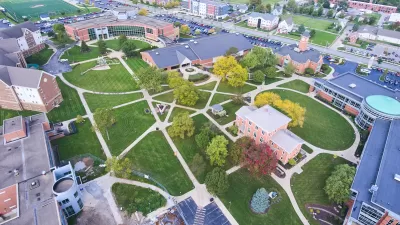In an opinion piece for The Wall Street Journal, James Piereson and Naomi Schaefer Riley argue that its time for educational institutions to pay their fare share of taxes to support the communities in which they reside.
"As cities and towns struggle to pay for public services, it's hard to blame public officials and taxpayers for wondering why well-off educational institutions aren't sharing the load for police and fire departments, sanitation and road maintenance," write Piereson and Schaefer. "The reason they don't dates to 1917, when Congress decided that educational institutions, which then operated on a far more modest scale, should be exempt from federal income taxes."
"In the intervening decades, some schools like Johns Hopkins, Yale and Duke have worked out Pilot (payment in lieu of taxes) programs with cities or towns," they add. "But these donations fall well below what the universities would owe in taxes."
In lieu of Pilot deals, which are "often secretive and contentious", the authors suggest "it's time to treat universities like for-profit enterprises."
FULL STORY: James Piereson and Naomi Schaefer Riley: Why Shouldn't Princeton Pay Taxes?

Alabama: Trump Terminates Settlements for Black Communities Harmed By Raw Sewage
Trump deemed the landmark civil rights agreement “illegal DEI and environmental justice policy.”

Study: Maui’s Plan to Convert Vacation Rentals to Long-Term Housing Could Cause Nearly $1 Billion Economic Loss
The plan would reduce visitor accommodation by 25% resulting in 1,900 jobs lost.

Why Should We Subsidize Public Transportation?
Many public transit agencies face financial stress due to rising costs, declining fare revenue, and declining subsidies. Transit advocates must provide a strong business case for increasing public transit funding.

Paris Bike Boom Leads to Steep Drop in Air Pollution
The French city’s air quality has improved dramatically in the past 20 years, coinciding with a growth in cycling.

Why Housing Costs More to Build in California Than in Texas
Hard costs like labor and materials combined with ‘soft’ costs such as permitting make building in the San Francisco Bay Area almost three times as costly as in Texas cities.

San Diego County Sees a Rise in Urban Coyotes
San Diego County experiences a rise in urban coyotes, as sightings become prevalent throughout its urban neighbourhoods and surrounding areas.
Urban Design for Planners 1: Software Tools
This six-course series explores essential urban design concepts using open source software and equips planners with the tools they need to participate fully in the urban design process.
Planning for Universal Design
Learn the tools for implementing Universal Design in planning regulations.
Smith Gee Studio
Alamo Area Metropolitan Planning Organization
City of Santa Clarita
Institute for Housing and Urban Development Studies (IHS)
City of Grandview
Harvard GSD Executive Education
Toledo-Lucas County Plan Commissions
Salt Lake City
NYU Wagner Graduate School of Public Service





























